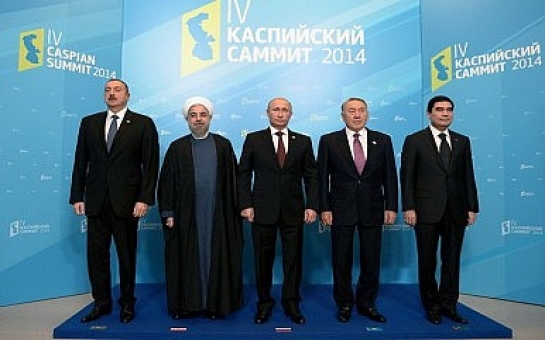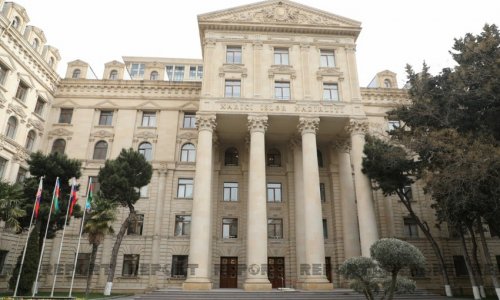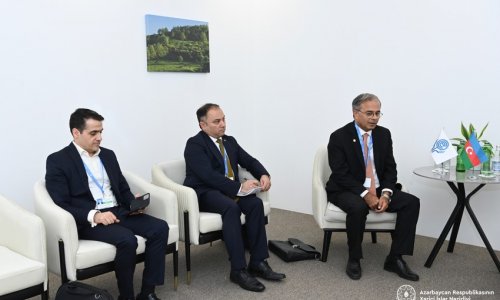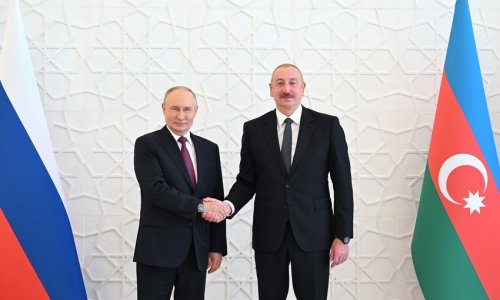(Eurasianet) - The biggest headline to come out of the weekend's Caspian Sea summit in Astrakhan, Russia, was that the five countries along the sea agreed to prevent any outside military presence from the sea. This has been a longstanding goal of the sea's two biggest powers, Russia and Iran, the result of worries that the U.S. and/or NATO would somehow gain a military foothold on the sea via security cooperation programs with Azerbaijan, Kazakhstan, or Turkmenistan.
Russian President Vladimir Putin, summing up the summit's results and formal declaration, said:
The declaration sets out a fundamental principle for guaranteeing stability and security, namely, that only the Caspian littoral states have the right to have their armed forces present on the Caspian. This was the way the situation developed over history, and we do not seek to change it now. In general, only the five Caspian countries that have sovereign rights over the Caspian Sea and its resources will resolve all matters pertaining to the region.
Russian analyst Alexander Knyazov specified that, as many assumed, Azerbaijan (which has had the most active security cooperation with the U.S. on the Caspian) was the target of this statement: "The militarization with the support of Atlantic allies in the conditions of tension in international affairs makes Azerbaijan the weakest link in Caspian security, and the issue of the exclusion of non-Caspian countries on to the sea remains extremely relevant."
But since then the U.S. and Azerbaijan have pushed back against that statement.
Azerbaijan's deputy foreign minister Khalaf Khalafov said after the summit that issues of armament have yet to be fully worked out: "We are in favor of peace in the Caspian Sea. The countries need to be careful while organizing marine defense and be based on balanced armament. The issue of arming and the security factor are also reflected in the joint statement. However, a balanced formula is yet to be prepared. This will be dealt with by the common commission."
And Azerbaijani political analyst Mubariz Ahmedoglu said that there was no need to worry about a U.S. naval base on the Caspian: "The Caspian countries can maintain security themselves ... moreover, if the West didn't set up a base on the Caspian when Russia was weak, they're not going to do it now, either. And according to the constitution of Azerbaijan, no foreign military base can be established on the territory of Azerbaijan or on its sector of the Caspian. We have never tried to get other countries, including NATO countries, to appear on the Caspian."
The U.S. State Department, asked about the declaration, said it doesn't intend to change anything about its military cooperation with Baku: "We have seen the joint statement issued by the Caspian Five that, among other things, calls for the non-presence of armed forces in the Caspian Sea not belonging to one of the Caspian Five countries," said State Department spokeswoman Jen Psaki. "We maintain a strong security cooperation relationship with Azerbaijan, focusing on border security, counterterrorism, NATO interoperability, and its capacity to contribute peacekeepers to international missions. We do not anticipate the Caspian Five joint statement will change that."
Interestingly the Russian press, which has attempted to make Psaki into a sort of Baghdad Bob comic foil for her frequently anti-Russian and occasionally misinformed pronouncements, seems to have completely ignored this statement.
Also interesting were the reactions from the other Caspian countries. Iran, unsurprisingly, welcomed the statement. Kazakhstan, also probably unsurprisingly, downplayed the statement: President Nursultan Nazarbayev, in his address at the summit, didn't mention the issue of foreign militaries at all and instead focused on trade.
But intriguingly, Turkmenistan praised the exclusion of outside military forces: "In the signed declaration one of the fundamental principles for maintaining stability was enshrined, the exclusion of the presence of military forces not belonging to littoral countries on the Caspian."
Bakudaily.Az











